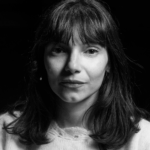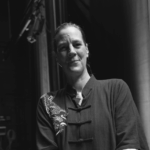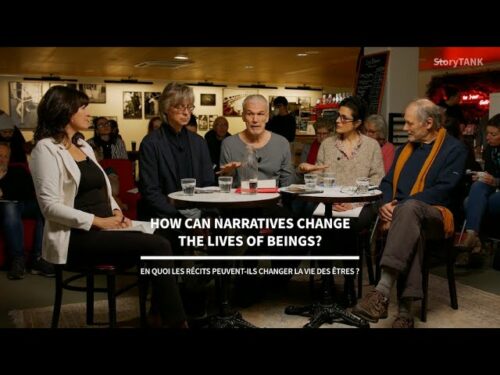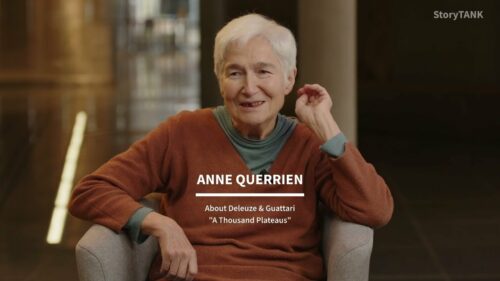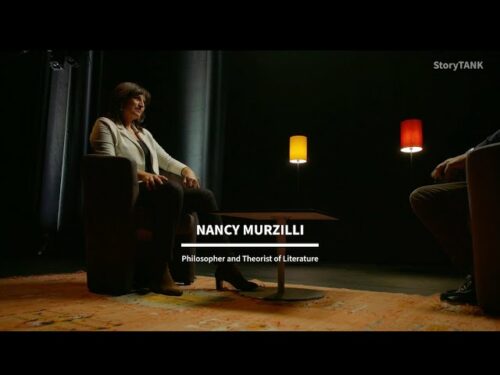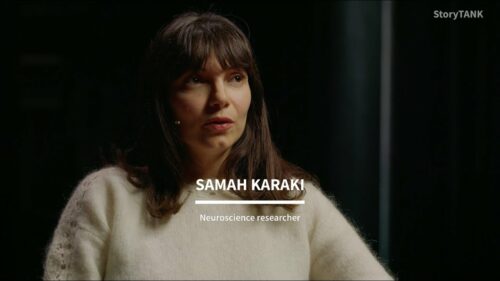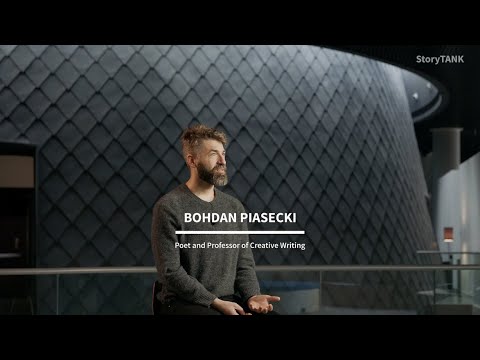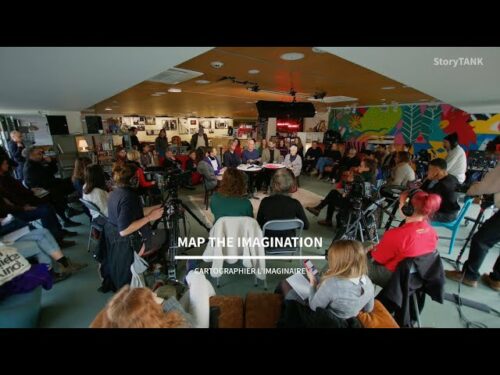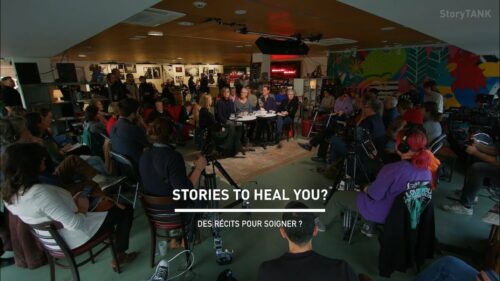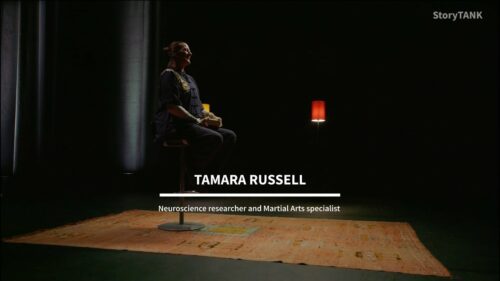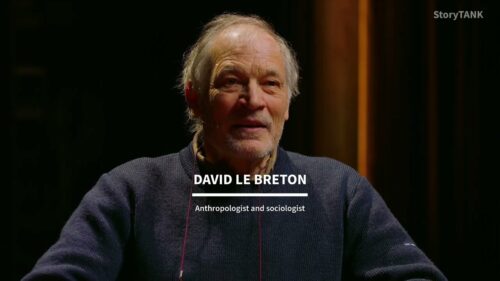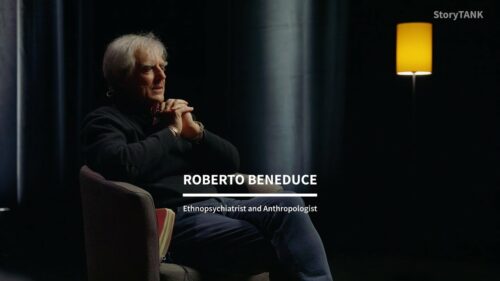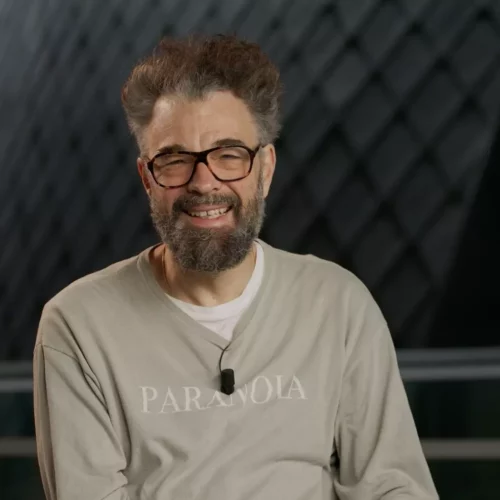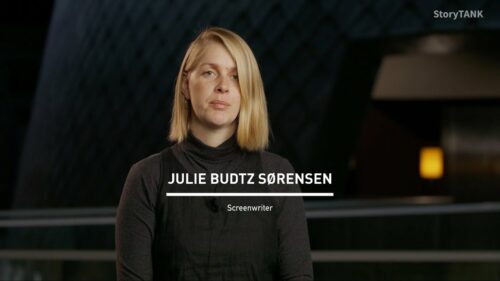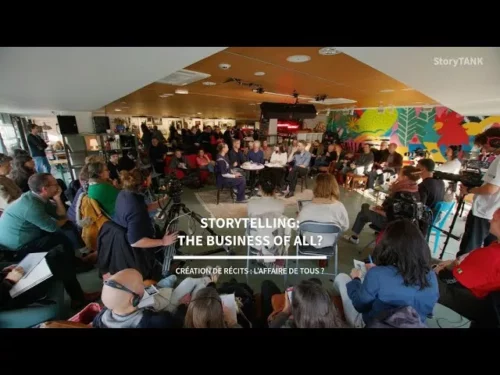Storytelling: the Business of All?
Neuroscience sheds new light on the myth of Creative Genius.
Would we all be able to create streams of imaginary worlds and wild stories?
With Jan Schomburg – Screenwriter & Director (Germany), Samah Karaki – Neuroscience researcher (Lebanon & France) and Tamara Russell – Neuroscience researcher and Martial Arts specialist (UK) as well as Thomas Roze (France) – Osteopath and witness of this round-table.
— conference recorded at Les Champs Libres (Rennes) in December 2023 in the framework of the series “What stories for our time?”, moderated by Yann Apperry – Screenwriter, Playwright and Novelist – and Nicolás Buenaventura – Writer-director and Storyteller.
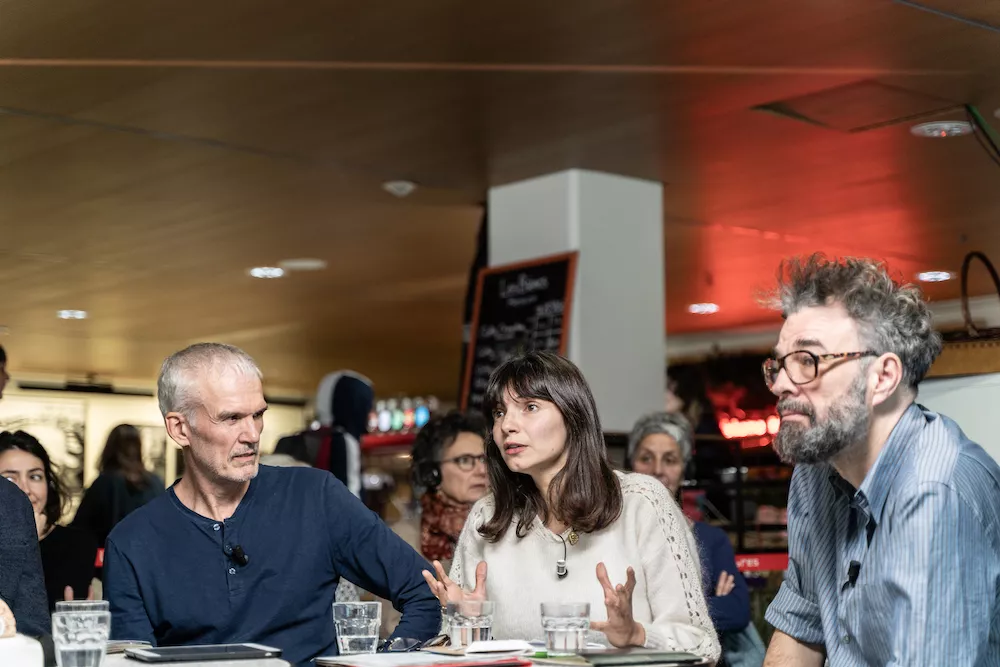
Samah Karaki
« And then the inspiration would come from the default network of the brain that actually stored all this, this salad of experiences. And instead of searching, it’s a cooking recipe. »
Automate to free us.
Right now, we are all doing lots of physiological mechanisms in a very automatic way.
You’re not aware that you’re breathing. Actually, you’re surviving each other second. You’re about to die, and then you breathe, and you’re alive again.
And you’re doing this because you are kind of relying on this autonomous nervous system that is telling you, I’m taking care of digesting your food and maintaining your body temperature and fighting any stranger germ coming into your body so that you can listen to these people talking, right? You are available to do something else. Your executive system is not aware, not preoccupied by all of these issues, right? So, what’s amazing in our brain that not only our survival issues are automatic, but also everything that you’ve been through.
The language I’m using, I’m not born speaking English and so, at some point, I had to automatize this language so that I can go beyond the symbols and bring meaning to what I’m saying. The way we walk, the way we sit, everything you’re doing right now is actually… you’re not processing this actively. We need to be first grateful to have a system that is allowing us to be available to do something else.
Accept the ambiguity and uncertainty of the world.
We rely on this automatic system because we don’t have enough energy to process the world every time we look at it. But bias is actually when this system fails.
For example, we’ve been a few hours together, but I already judged you based on my automatic cultural, social experience, past experiences of people that look like you, that behave like you, right? I need sometimes to say actually, “I don’t know you”. And I know that I’m having this because I’m having this judgment automatically. But I need also to accept that you are an ambiguous object. But it’s not OK for me to accept this for everybody here because it’s such a cognitive load to accept the ambiguity of the world and the uncertainty of the world.
I don’t want to sound like other neuroscientists asking people to have critical thinking and to always think against ourselves with this metacognitive issue. Because we don’t have enough energy for that. But if I want to delve into a creative process, then I must be doing what you talked about, Jan. I need to fight against my urge to describe the world the way I see it. It’s actually to forget about myself, which is kind of impossible, but we tend towards this. And maybe a trick that we can use is instead of me doing this work alone, is to question you, who you are. And that’s how it becomes collective narrative creating. Because I am actually accepting to hear your perspective and to give it the same exact place I give it to my interpretation of what you are. And also, another trick would be to share experiences because the more experiences we share, the richer my interpretation of who you are becomes.
Maximize collective intelligence.
But let’s say I belong to a school of thought that would defend another way of dealing with ourselves and would consider that we don’t have as much willpower as we think we do, that we don’t have any. That actually we are determined by our past experiences. But actually, this metacognitive, this you know me, looking at myself, I believe it’s more efficient when it’s done by others, when I’m allowing others to let them show me how they see what I’m looking at.
I believe also mental health is an issue of the quality of interactions we have with others. But also, our self-discourse and our sense of who we are and why we are doing the things we are doing them. How can we create default environments where actually what I’m seeing is complex, where I am facing the limits that I have in my perceptions with the complexity of the perceptions of others? If I think, for example, education.
Education that is based on willpower, on the illusion of willpower. And that’s why is it interesting to fight for social mixity? It’s because when I’m actually experiencing learning with others, I am kind of unconsciously, in very implicit ways, learning that the word is complex, when we speak different languages. We are not saying, oh, this could be called “cup” and “kub” (كوب) and “verre”. I just know it’s that truth can be called differently. I think that we should reflect on environments and social connections to develop critical thinking instead of relying on the individual efforts. Something that I guess we can connect to what Yann was talking about. I guess there are some collective intelligences.
Questioning racial biases and prejudices.
Let’s discover our racial biases and prejudices. Well, you can say, “yeah, I just had a racist thought.” You’re not going to change it. You don’t have the ability to go inside your habit system and say, “I’m not going to smoke anymore. I’m going to meditate. I’m going to do sports in the morning.” But your brain says, I like those ideas, but we don’t have energy to change that. But when does it become interesting? When we are actually faced with the diversity of others because my friends are diverse. Because the people I love are diverse. I don’t have even to question my biases. I’m actually building better automatisms. This is something that we reflect on collectively. How do we build districts? How do we reflect on the urban landscape? How do we imagine narratives that we share with others?
And this is maybe the responsibility of when we write. It’s about making it possible to show the complexity of the reasons why people do what they do. And I’ve read this sentence lately. Sarah Schulman, she’s a writer called “Conflict is Not Abuse”, which is like an amazing book about empathy and about understanding that people, even when they seem monsters to us, well they are not sleeping at night saying, “I’m a bastard”. They’re also sleeping saying, “I’ve done the best that I can do.” And to really acknowledge that people always have very good reasons to believe what they believe in and to behave the way they believe.
The free desire.
Like the neuroscience field already have positions regarding this idea of willpower and free will, showing from a neuro-scientific perspective meaning experiments done in a laboratory that are not close to being as complex as what we actually experience as decision making in our actual life. But it shows that even when we believe that I decided to say something or to behave or to move my hands, the brain already processed this information and took the decision in a very implicit way based on my past experience again and not my ancestors guiding me or whatever It’s based on my past.
I’m determined by my past experiences. And what comes after is my consciousness rationalizing the decision that I’ve taken. But then again, this is the context of the laboratory experiments. It’s not as complex. We talk about free want and not free will because I can observe myself on the verge of saying something that I refuse to say. My seven-year-old kid, sometimes he wants to say a big world and then he stops himself. So, he’s doing this free want. But we have to remember that this is costly, it takes energy. We can experience it from time to time. We all experience some kind of willpower against ourselves. But we don’t have to fall into the illusion that this work is continuous. And it’s a luxurious work. It’s something that takes lots of energy and lots of willing to accept that we’re wrong, which is again something because we are more attached to the feeling of coherence.
And that’s why, by the way, algorithms of social media are built. Are built the way to nourish these needs by creating the filter bubbles where you will actually only need the information that you already agreed on because we don’t want you to spend a bad time looking at your social media wall. I’m going to make you see what you already know and like. And that’s how we end up saying, “I don’t understand people who…” Right? It’s because you believe that they have willpower to decide on their decisions and actions again. And they are actually living in the same nature of this bubble that completely confirms what they have already as ideas and perceptions.
Caring for yourself to open up to others?
Effort can come with pleasure too. If you look at kids playing, sometimes I fetch my son at six, he says I’m too tired to go do some grocery shopping. But then if you go to the park, then he’s going to play for two hours and he’s going to sweat. So, it means that your abilities are kind of adapted to the level of difficulty of the task you’re doing.
But this is when you’ll be in this flow state where you finish your session of writing and you sleep like a baby. But then there’s something pleasurable that comes with it. And I hope that every one of you and myself experience that flow from time to time. It’s like kind of orgasmic states where we’re doing. It’s not comfort zone, but it comes with other also conditions.
When we analyse, what does it actually do in real life? All the work we do on ourselves in our individual sphere: if we look at the percentage of implication and engagement of these exact people, in the actual things happening to others, we see that the more you work on it in your individual sphere, the less you care about actually what’s going on around you because it becomes too violent.
And if we look now, it’s like the personal development sphere is the one that is less vocal about wars and about adversity around the world, because they want to be shielded, because they’re too sensitive for that anymore. It’s also interesting to see in real life when I think beyond my body posture, is it making me actually less narcissistic?
Inspiration is a constant connection.
There is a very similar question that was addressed in a letter to Rainer Maria Rilke. He said, when I’m stuck, what should the character do or what description of his character would be? And Rilke said: well, just go and live. Live. Visit cities, fall in love, fall out of love. Get hurt, you know, like meet… Just forget about that and go and live and trust that your brain will do something about it. He didn’t say it this way, but this actually what happens is that you will not sit and say: “what would my character do?” Sometimes writers let us to believe that this is how they work. Maybe you will. Like Dostoevsky. But actually, Dostoevsky was a very social person. He was out there meeting people, discussing his characters, other people. And then the inspiration would come from the default network of the brain that actually stored all this, this salad of experiences. And instead of searching, it’s a cooking recipe. And you should see it with the spice or not.
Confront perceptions.
This is, I think, a question that is very relevant to the care sphere, but also to the journalism sphere, to politics and to storytelling. Do I have to feel the pain, to know the pain, in order to talk about this? And you know, in journalism, we call it the death-kilometre bias. I have more empathy to the people that I know, other people that look like me. So, it’s not subject. But the question is, this is also what led people to talk about male gaze. It’s that because women said, “no, no we do not comb our hair this way.” It’s because you do not feel not only my pain, but you don’t feel the way I deal with my body. The way you’re depicting it is through your own perception again. Then we can also talk about colonial gaze. I don’t know if you’ve seen “The Crown”, the last season of “The Crown”, with Arab people depicted in a very biased way: we’re simple people, we only want occidental people to like us. But you know, only Arab people actually said: “hey, why are we always painted this way?” And Asian people say the same about how they are depicted in a very biased and very simplistic way.
So, do you have to be Arabic and Asian in order for you to tell non-biased storytelling? Again, the question is, can I feel legitimate to describe or to talk about certain people’s pain or joys if I see them as a group, as dispositions and not as complex as I see myself and my own group? And my answer would be, again, go out there, meet these people, hire them to tell you what they think about your gaze. And this is where also collective storytelling becomes interesting. It’s because I do not live 400 years and I sleep a lot as a human being also. So actually, the time that I have left for me to understand and apprehend the complexity is very limited. So that’s why it’s interesting to actually open up to other people also sharing their gaze and to let people describe, since we have this empathy bias, let people validate that what you’re talking about is actually, this is how I feel.
Understand the complexity of each character.
There’s a trap storyteller can fall into. It’s because they want to include as many as diverse characters inside their storytelling that sometimes it becomes a caricature of what they want. So, talk about what you know. I prefer not to have a gay character or an Arab character or whatever, if you are not going to show this character in its complexity. There is this black friend always being there but not being the main character and always being kind and funny and, you know… the cliché. So, either staying and not making it an intention to create diverse storytelling when you’re not actually able to really apprehend this complexity.
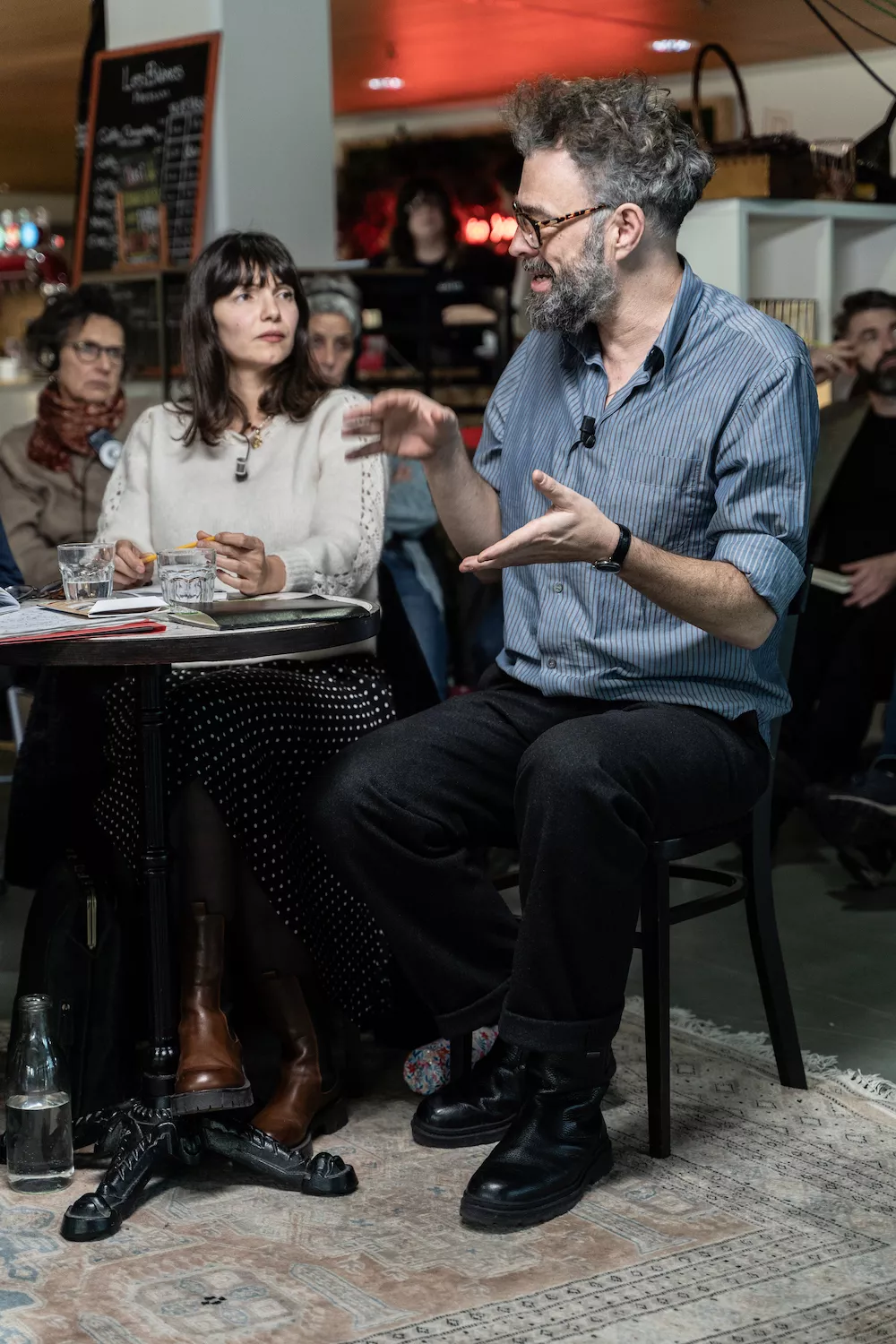
Jan Schomburg
« At some point, you have to let go… But before that, I also feel you’re building little rivers where you can then flow. »
Letting go.
For me, as a writer, you have to be in a flow. I mean, at some point, you have to let go. And you have to give yourself to the universe. And you have to be in a connection. And then you are just like a helpless little thing that just gets thoughts. But before that, I also feel you’re building little rivers where you can then flow. In the Bartleby thought, I prefer “Nurture” is in writing, very important because, of course, very much the first impulse of doing something is also really bad. It’s mainly also to decide: “oh, this comes from… I’ve seen this in other movies, or this is like a bad idea.” I feel very close to that thought of watching from above, but also being inside at the same time while writing.
How I have been taking care of myself? I have Ritalin, which is a good drug to focus. And apart from that, I would like joyfully and vehemently disagree to you, Samah, when you say that it costs a lot of energy to go into this meta perspective, if I understood you right, and that it’s a luxurious thing. I have the feeling I see it in every kind of culture: I see certain people who have this ability and or some have also learned it. I don’t think it’s effort.
Collective stories.
What I’m dreaming of is a structural way of storytelling that is not bound to the protagonist. I’ve been working and thinking on that for really decades. And it’s really hard to find a way to do that. What would be a collective way of storytelling? And I’m not speaking about telling a collective like, of a protagonist. I’m speaking about structurally changing the way of storytelling.
A story is an idea.
We have aesthetic artistic views on filmmaking and stories to solve this “identity politics problem”. Because bad storytelling exists, that shallows character. And there are some things where you need a very good idea to do that. Like if I would now do something, for example, like a Spike Lee movie where only whites would play the black characters in Queens, I would have to have a very good idea of it. But we can all feel that it feels wrong in an artistic sense. But for example, we did a film about Stefan Zweig. My grandfather was SS. I’m not Jewish. My wife is not Jewish. But I think we had a really good idea about what is exile and what does it mean. We were telling a story about Europe, but it was set in South America… I think we had a good idea about it. It was a specific idea about this character. Then you can tell, as a grandchild of an SS officer, you can tell a story about a Jewish refugee. But you need a good idea, I think.
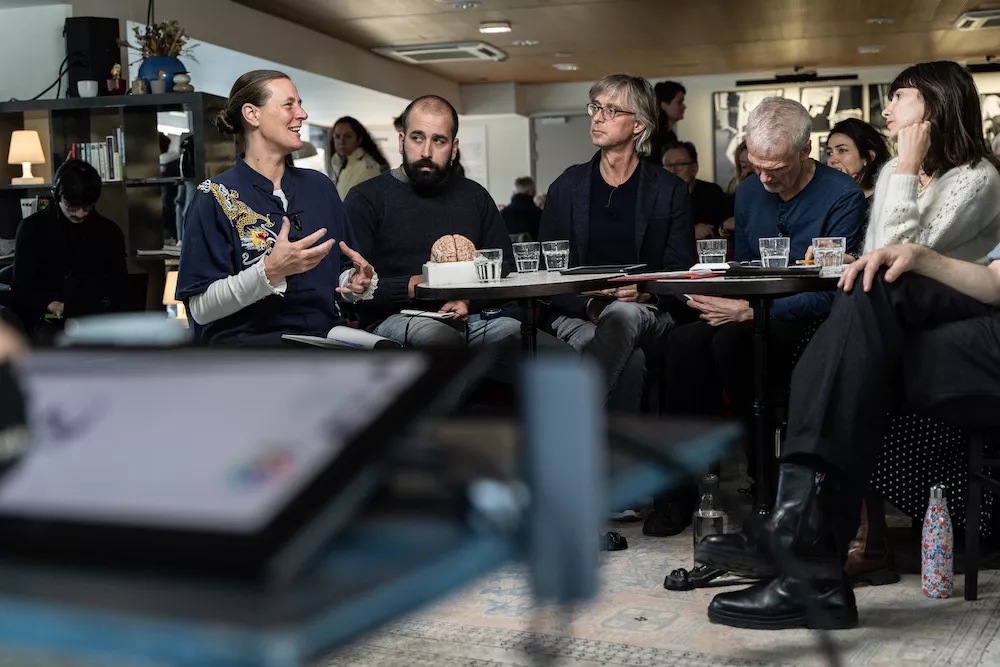
Tamara Russell
« Attention is a primary vehicle for how we experience the world. »
Unlearn to open the story.
I think the phrase that comes to my mind is unlearning. And that doesn’t mean throwing learning out, but it’s recognising that in that learning journey from these big wide-open eyes of a child funnelled into society, status, education, career, expertise, tribe, there’s a narrowing and that makes things more efficient. It allows us to take advantage of automaticity.
But maybe we reach a certain time in our lives when we realise that unlearning is going to bear more fruit. And this is perhaps when my approach is mindfulness based on ways of trying to open up the thinking, to enrich the memory banks with kind of new information and to maintain an awareness of more than just what’s on my mind. The brain is really awesome and is helping us to maintain relatively upright posture. But anybody who’s worked at a computer for a long time, the posture will go like this and then it’s like, OK, “how can I maintain that awareness of my body, keep that bodily information flowing into my brain, allow my decision making and creative process to draw on all sources of information?”
Take unmarked paths.
For me, what’s been really helpful is really keeping an eye out for the “I know” mental monkey. The minute I think I know, it’s not to dismiss the things I know, but it’s to then know that that’s a moment to just be careful. Because there’s a neural pathway that’s getting ready to fire that is smooth and deep and easy. It’s like being on the auto ban. And actually, there might be something more fruitful if I get my machete and I go this path, that isn’t well trodden.
We’re not even aware that we’re thinking, we’re just kind of in a thinking process. Then we have this opportunity to create the dyad of subject and object. So, it’s like, “oh, here is a thought”. And here is something that knows its thinking: homo sapiens sapiens. And what you’ve now got is a relationship and you’ve got options. But if I think about techniques like CBT: CBT then says, get back in there. But I want you to figure out why this thought is wrong. And I want you to be like a legal person and say, “no, that’s not right. No, that’s not.” It’s a bit hardcore. I’m exaggerating. It is Cognitive behavioural therapy.
Restructuring thoughts with a kind of arguing method. Versus in a more mindful, compassionate mode. Yes, there’s the effort of being aware of the thoughts. But we’re alert but relaxed. Not alert alert. Alert relaxed. And we say, “wow, look at that mind go. Isn’t that interesting?”
Self-abandonment in the narrative.
In terms of the energy, this idea that, “it’s a luxury to be able to train your brain…” : if I want my mind to be alert, relaxed, I make my body alert, relaxed. I get that we’ve got various ways of training in mindfulness. But my own kind of unique variant of that is we do it every day, we do it in every movement. Bruce Lee style, picking up the shopping, putting on a jacket, hashtag no cushion. We can do it in ways that are accessible to everybody, even a busy working mum or a health professional or someone in a psychotic break like.
I’ll say one more comment about the energy and I’ll draw maybe now more from a martial arts perspective. Yann was talking about that moment when you kind of surrender to the universe. And I suppose in martial arts and particularly in Qigong, which is the more healing, energetic aspects of martial arts, we talk about two different kinds of chi. If you’re going to a Qigong master, there’ll be one kind of Qigong master who is using their own chi to heal. There’s another kind of master that it’s almost like channelling. They remove themselves from the equation. They remove their egoic self from the equation in order to open to what they would call the universal chi. And at that point, the cosmos is doing the healing and the human is merely a vehicle. So maybe the inquiry is what is the role of surrender? What is the role of surrendering?
Better know myself to connect with the other.
My experience of practicing mindfulness, how does it benefit, I think will meet and will join because how it’s helped me is in human connection and presence and relationship and deepening those micro moments of connecting to a bus driver or a shopkeeper or a family member or a patient. And the kind of resilience and the robustness that has come from, getting to know my own emotional reactions, does increase sensitivity to what others are experiencing. And certainly, in mindfulness, the whole theory of that is turning towards that which is unbearable. It provides us with that capacity to actually really look at what is difficult, done well, done with supervision and guidance from a more senior person, but it’s that ability to stay with the terror, the pain, what somebody else might be sharing and then from there, who knows, but there’s at least possibility for dialogue sharing, problem solving, storytelling or whatever wants to come next.
Pay attention to experience the world.
What I would suggest is explore how your character might be different depending on their capacity to pay attention.
My mind went to attention deficit problems and you know, absolutely people with ADHD experience and interact with the world, learning, relationships, emotions in a different way from people who have a kind of normalized attention network. And I believe this is an important question for our time because there has been a tsunami of ADHD diagnoses, some of which may or may not be related to digital natives and the use of the technology that we have. My belief is that that attention is a primary vehicle for how we experience the world and therefore we must really honour it and value it and not give it to our devices and let people market it and make money from it. This is our most last precious gift that we have for our children. High quality, present moment, non-judgmental attention that ultimately has care as its core foundation. I just felt quite strongly to say that.
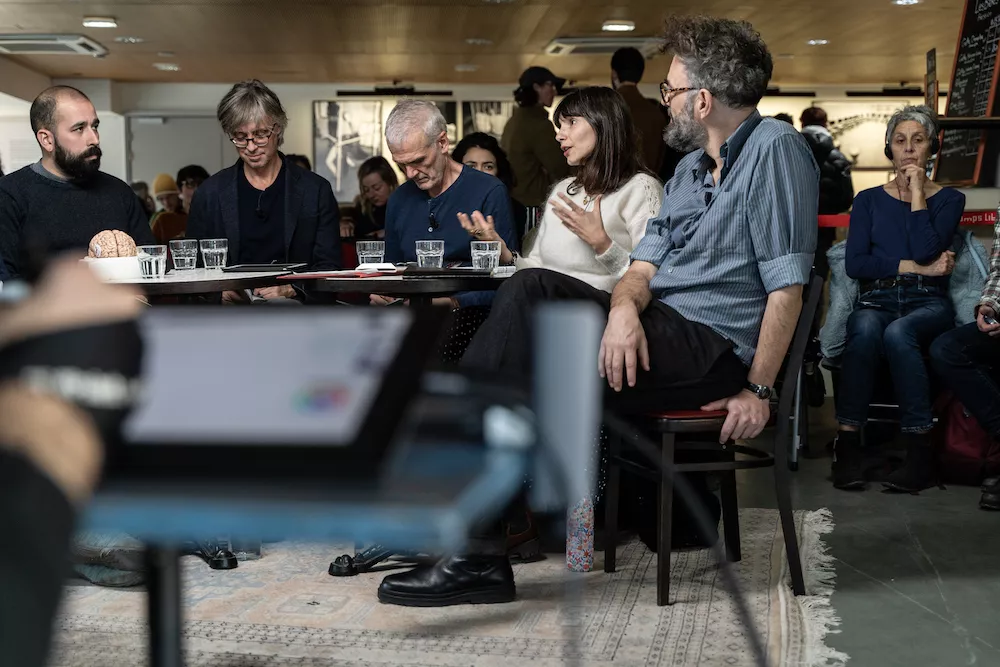
Thomas Roze
« Osteopathy has a lot of similarities with the martial arts, with the foot pressure, the feeling of your balance, your own balance in order to feel the patient’s balance: if you’re like this, you will not have the same availability of reception to your sensations. »
Experience to feel.
So, first of all, the main difficulty for me is to deal with my own perceptions of what the patient is telling of what I’m feeling because I’m working with my hands. It’s highly subjective ground. And I always have to go back and forth between what do I really feel, is it something that I want to feel or is it something that I really feel? And is this perception different from what the patient is experiencing? And it’s mainly about the main factor that we deal with is pain. And we have a lot of scales in order to graduate the pain and in order to kind of make it easy for us to identify which disease or which trauma can cause pain. And it’s mostly now about the suffering, the experience that the patient has.
And it’s sometimes difficult for us to have that kind of subjectivity towards what the patient is feeling. And I also sometimes feel that when I’m in pain, I’m far better to understand the patient pain. And when it’s been a long time that I don’t have any pain, it’s quite harder for me to see what the pain is doing to the patient. Why is he suffering from something that I would judge as not really important? And I lately spoke with my wife about it because she’s a midwife. And she said to me that she was speaking with a lot of her colleagues and that the fact that her colleagues had given birth completely changed their way of taking care of the patient. Because they had to be in the opposite situation and to experience it, it’s far easier to deal with my empathy and to quite understand what the patient is having.
About empathy, I’ve always told myself it’s a question that I have, I don’t know if you could answer it. My thinking is that sometimes when the patient is feeling pain or having a problem, it’s more that I’m trying to help myself, helping him. And it’s me that I try to comfort and to ease when I’m trying to ease the patient’s pain. And I don’t know if empathy is like a selfishness, which is something that would be quite hard for me to progress, but I can deal with it. Or if it’s really something that I’m trying to do to the patient that, yes, has the effect of helping me also.
Share, in duet, to heal.
I have to put my perceptions into the patient perspectives. I have to feel the things with the patient in order to make them also realize that maybe there’s something wrong there. And the interesting thing is that sometimes when we touch the body, when touching a zone, a certain area, the patient starts to talk about that zone which is a thing that he didn’t do during the interrogation part of the consultation. He wasn’t aware of it. And just by touching it, I don’t know if it’s that the patient starts to put his attention to the zone and starts remembering things and talking about it. But it’s always a mutual flow that we have to have in these relations. For example, with the sound of the voice, I sometimes see that I’m speaking a bit lower, a bit deeper. And the patient starts to ease and the movements come more fluid. And it’s really a two-work thing. Two people work thing.
There’s a lot of similarities with the martial arts, with the foot pressure, the feeling of your balance, your own balance in order to feel the patient’s balance. Because if you’re like this, you will not have the same availability of reception to your sensations. I’d say it’s going deeper in the body in terms of perception, but also to get away in terms of intellectual process and to just become the feeling and the sensation. Just no ideas, no “What am I going to eat this evening? My fridge is empty?” or all the kind of things that my mind does when I’m a bit tired. And just to be focused on the task.
